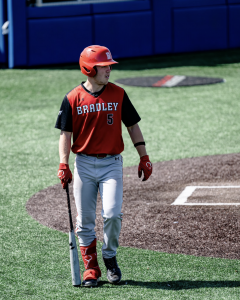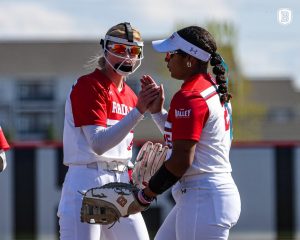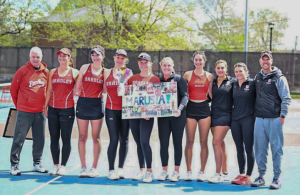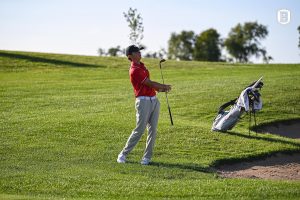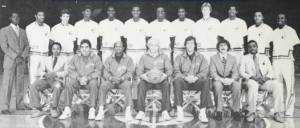
In March 1982, the madness of the 44th National Invitational Tournament was only 25 seconds away from coming to a close.
As the Braves battled Purdue, Bradley guard Barney Mines stood at the free throw line in Madison Square Garden in New York City, calmly swishing two free throws to extend the Braves’ lead to six, 64-58. Those two free throws iced the game and the NIT championship for the Braves, which is the last national championship Bradley basketball has won.
The 1981-82 Bradley Braves team remains one of the most highly regarded teams in Bradley basketball history, with players including the likes of Mitchell “J.J.” Anderson, David Thirdkill, Voise Winters, Donald Reese and Willie Scott, who all went on to play professional basketball.
In exclusive interviews with The Scout, point guard Scott and forward Anderson recounted their historic season.
“I would joke with [Jim Les] and tell him good point guards win, [and] great point guards win championships,” Scott said. “I was the last point guard to win a championship at Bradley.”
Scott, a former assistant coach under Les for the 2010-2011 season, wasn’t one of the star players on the NIT champion team. Rather, he called his supporting role one of the decisive factors as to why the team won the title that year.
“The reason I chose Bradley with Mitchell Anderson and not DePaul with Mark Aguirre… was because I looked at Bradley’s team, and I knew that I was the missing link,” Scott said. “I knew I was the missing link, and I knew walking in there we were going to win a championship.”
Scott stayed true to his contributory part, amassing 6.2 assists per game, while playing behind the main stars of the team in Anderson, Thirdkill and Reese.
“We had the team,” Anderson said. “My role was to score points, and [Thirdkill’s] role was defense, and that’s all.”
Anderson, the MVP of the 1982 NIT tournament, compiled a team-leading 16.4 points and 7.6 rebounds per game during the 1981-1982 season, where the Braves compiled a 26-10 record and won the Missouri Valley Conference (MVC) regular season title.
Although they finished with the best regular season record in the MVC, the Braves struggled at the start of the regular season.
Heading into conference play against Indiana State, Bradley had a dismal 5-6 record and was returning from the Rainbow Classic in Hawaii, where the team dropped all three games of the tournament against San Francisco University, Hawaii University and Cal-State Fullerton.
“[The loss to] San Francisco, I think, was a bad call,” Scott said. “That’s when [head coach] Dick [Versace] took the whistle out [of] the guy’s mouth and threw it in the stands.”
However, once in conference play, the Braves showed their dominance.
After the loss to Cal-State Fullerton, the Braves posted a 14-3 record through the final 17 games of the regular season. Included in those 14 wins are victories over second-ranked Wichita State, eighth-ranked Tulsa and a season sweep over I-74 rival Illinois State.
“We regrouped,” Scott said. “I thought we had peaked at the perfect time but [we] lost in the [MVC] tournament.”
That tournament loss came to Illinois State in the second round of the MVC tournament and ended up being the decisive reason that the Braves were left out of the NCAA tournament.
“We lost in the conference tournament because Thirdkill was hurt, and Willie [Scott] was hurt,” Anderson said. “We deserved to be in there.”
While conference winners automatically get bids into the NCAA tournament, the Braves were hoping for an at-large bid, which depended largely on their regular season results and strength of schedule.
This infamous decision by the NCAA that kept Bradley out of the tournament remains as one of the biggest snubs ever, not only in the eyes of Bradley fans, but especially to the team on the wrong side of the decision.
The week of the NCAA tournament selection Sunday was a week off for the players, and the team went home to spend time with their families. When it was time to return to campus, Anderson, Scott and a few other players who were Chicago natives, drove back to Bradley together.
It was during the ride back when Anderson and Scott said they decided to pull the team together, and put the focus on the upcoming NIT.
“We were riding back, and we were talking,” Anderson said. “I said, ‘We didn’t get a bid into the NCAA [tournament], but we got a bid into the NIT.’ [Then] Willie said, ‘We’re going to take the NIT,’ and I said, ‘Fine with me.’”
Instead of letting their misfortune at the hands of the NCAA ruin the season, the team used the snub as a battle cry going into the NIT.
“At that point, we were very mature,” Scott said. “We accepted that there was some adversity, and we matured and took on the challenge of the NIT and just kind of murdered everybody.”
Although the Braves took the challenge of the NIT, it did not prove to be a test for them.
On their way to the title, Bradley beat American University, Syracuse, Tulane, Oklahoma and Purdue by an average of 13 points per game.
“We were focused,” Anderson said. “We played against Purdue, and we blew them out. We played against Oklahoma, and we blew them out.”
Scott said the focus the team had evolved into a grudge to somehow prove they belonged.
“We had a chip on our shoulder, and we felt that, again, we had been mistreated,” Scott said. “We took it out on every team that we played.”
The Braves returned as champions, and etched their names in athletic history on the Hilltop. Scott said the team won the game not only for themselves, but for Bradley as a whole as well.
“That was always our speech,” Scott said. “Let’s do it for Bradley. Let’s do it for the fans. Let’s do it for the community. This is not just about us; this is about everyone involved.”
Scott also said the feeling of winning the title was one unlike any other, but some of the disappointment of missing the NCAA tournament still lingered.
“When you win a championship, it’s the most gratifying moment of your life,” Scott said. “[But] we wanted the big one. We wanted to be in the NCAA that year, and I don’t think anyone would’ve beat us.”
Now, Anderson and Scott have both become coaches. Anderson is currently the head coach of the Chicago Steam semi-pro basketball team, and Scott is the assistant head coach of the basketball team of the American Institute of Business.
However, both said they would love to see themselves back on the Hilltop as head coach of their alma mater.
“I want to coach college,” Anderson said. “I don’t care where it’s at. If possible, I would be more than honored to coach Bradley, because me and Bradley have something special.”
Scott, who has already been an assistant coach at Bradley, left when Jim Les was fired in 2011. That split left a strained relationship between Scott and Bradley faithful.
“They hired Geno [Ford], and that was a very uncomfortable situation for me,” Scott said. “A lot of people at Bradley thought I just kind of kicked them to the curb and let them down by leaving, but what they didn’t understand was [how] I felt.”
Scott said that, in the future, he would hope Bradley considers him for a head coaching position.
“I love Bradley,” Scott said.” I love the Peoria community. I love the fans, [and] I miss them. I would come to Bradley in a heartbeat.”
Being the last Bradley basketball team to win a title brings a type of honor to the ‘82 Braves that other Bradley teams lack.
Although other players have come through the Bradley program that were better statistically, such as Hersey Hawkins and Patrick O’Bryant, both Anderson and Scott believe their 1981-1982 championship team was not only better than those teams but also one of the best in Bradley basketball history.
“We didn’t take s**t from nobody,” Anderson said. “Donald would beat Mike Williams’ butt, Thirdkill could beat Hersey Hawkins, and I don’t know who could stop me.”
“We were one of the greatest teams to ever play in the history of Bradley,” Scott said. “I won’t say the only one but one of them.”
